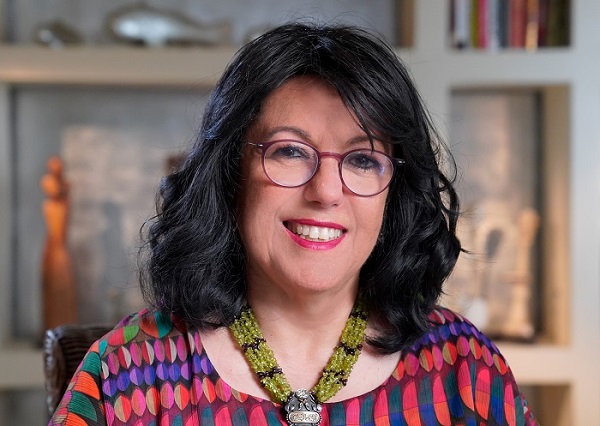
- Chairperson, Delta Shield for Investment (Banking, Finance)
“At the beginning, there was always that sense of “she can’t make it.” Then I realized that it may be a strength to have people underestimate your capabilities.”
Summary
Neveen El Tahri is the Chairperson of Delta Shield for Investment, a management consulting firm she established in 2011 with the goal of supporting young entrepreneurs, family businesses, and small to medium-sized enterprises (SMEs) that enhance economic growth in Egypt. Prior to founding Delta Shield for Investment, El Tahri worked in banking and played an early role in the Egyptian capital market, becoming the first woman elected to sit on the board of the Egyptian Stock Exchange and Financial Supervisory Authority.
El Tahri begins the interview by discussing her upbringing, which involved moving to several different countries due to her father's career as a diplomat. She lived in Panama, Finland, Lebanon, and Britain before returning to Egypt at the age of 17. Growing up in an English-speaking household, she overcame the challenge of learning and studying in Arabic. El Tahri’s father emphasized the value of hard work and her upbringing in several countries cultivated an adaptability to change. El Tahri describes this as a skill that would later benefit her education and career.
For her undergraduate studies, El Tahri pursued economics and political science at Cairo University. She opted for this program, which was entirely in Arabic, due to her father’s insistence on mastering the language. After graduating in 1980, El Tahri's passion for economics led her to seek a career in banking. She joined Chase National Bank of Egypt, aspiring to work in the credit department although she initially accepted a position as a teller. Determined to fight for her desired role, El Tahri secured a spot in the courses required for the credit department. She advanced through the ranks of the bank, reaching the position of general manager and head of the petroleum, tourism, and electronic corporate banking divisions. This experience, as she describes, taught her that “if you don’t ask, you don’t get. So you ask. If you don’t get it, at least you will have done the effort of asking.”
In 1994, El Tahri transitioned from her banking career to entrepreneurship. She started with various consultancy jobs and entered the world of brokerage companies, acquiring a license and becoming the founder of her own firm which partnered with American Express. She proceeded to build several other organizations, including an asset management company with ABN AMRO Bank of the Netherlands. As she describes, El Tahri’s international partnerships brought knowhow and helped her grow the maturity of the Egyptian market. One of the main challenges she faced during this period stemmed from her role as one of the first women in this environment. She discusses the resistance she received from her male colleagues when speaking up and their underestimation of her capabilities. Additionally, she speaks about a "boys' club" culture, as many business deals were conducted over male-dominated social activities that she did not partake in.
To navigate these challenges, El Tahri notes how she prioritized efficiency and the establishment of a credible reputation through dealings with high-profile clients. She also speaks about her role as a mentor and leader for other women in the industry, noting how “most of the time, the recruitment in my companies has not been less than 60% women.” Noting the difference between being leading men as opposed to women, El Tahri provides examples and contends that the multitasking ability of many women allows them to effectively manage the demands of both work and family.
El Tahri founded her current management consulting firm, Delta Shield for Investment, in 2011 following the Arab Spring. She describes a shift in culture that occurred in the wake of the revolution in Egypt, with increased interest among young people to pursue careers in entrepreneurship. This led to associated ventures such as 138 Pyramids, which served to financially support young Egyptian entrepreneurs in various industries. While highlighting successes, El Tahri notes that significant obstacles remain to entrepreneurship in Egypt such as a shifting regulatory framework and the tendency to take on debt when starting a business.
To conclude the interview, El Tahri speaks about her appointment as a member of the Egyptian Parliament, highlighting the challenges of politics. She expresses her views on the responsibility of businesspeople in politics to pursue agendas that benefit the public, rather than just their own companies. She also speaks about the work of the Delta Foundation, an NGO that seeks to develop a community value chain to socio-economically advance populations in impoverished regions of Egypt. While noting that Egypt faces challenges like the rest of the world resulting from geopolitical change and inflation, El Tahri expresses optimism for business in the country. She contends that the country possesses considerable wealth, emphasizing that it isn't solely about finances but also about a cultural heritage and historical legacy passed down through generations.
Video Clips by Topic
Innovation
Neveen El Tahri, Chairperson of Delta Shield for Investment, describes an increased interest in entrepreneurship among youth in the country particularly since the 2011 Egyptian revolution.
Additional Resources
- Malak Fouad. "Neveen El Tahri: What I Did Next." A&T Media, 12 December, 2022.
- Staff Writer. "In Conversation with Neveen El Tahri: Egyptian Investment Veteran & Founder of 138 Pyramids." Startup Scene, 8 February, 2021.
- Rachel Williamson. "What I Know About Being a Woman in Business: Neveen El Tahri." Wamda, 7 March, 2016.
- Gaelle Anne Fouere. "The Rising Number of Female Egyptian Entrepreneurs" BBC News, 19 March, 2015.
- Neveen El Tahri. "Cultivating the Entrepreneurial Spirit in the Middle East and North Africa" World Bank Blogs, 28 November, 2012.
Interview Citation Format
Interview with Neveen El Tahri, interviewed by Geoffrey Jones, Cairo, Egypt and Boston, MA, USA, 9 August 2023, Creating Emerging Markets Oral History Collection, Baker Library Special Collections and Archives, Harvard Business School.
